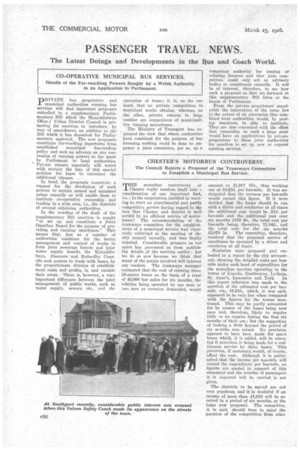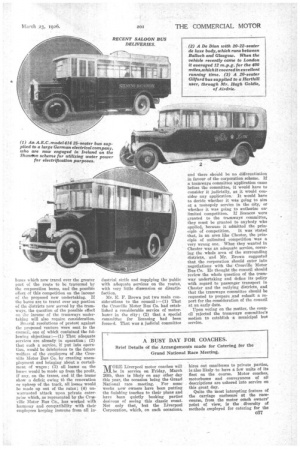CHESTER'S MOTORBUS CONTROVERSY.
Page 24

Page 25

If you've noticed an error in this article please click here to report it so we can fix it.
The Council Rejects a Proposal of the Tramways Committee to Establish a Municipal Bus Service.
THE motorbus controversy at Chester really resolves itself into a consideration of one important fact, i.e.: Is the corporation justified in wanting to start an experimental and partly competitive service having regard to the tact that Chester and district is well served by an efficient service of motorbuses? The recommendation of the tramways committee for the establishment of a municipal service was vigorously critieiapd at the meeting of the city council recently, and was finally rejected. Considerable pressure on our space has prevented ,us from publishing details pf the meeting earlier ; but we do so now because we think that many of the' points involved will interest our readers. The tramways manager estimated that the cost of running three 20-seater buses on the basis of a total of 45,000 bus miles for six months, the vehicles being operated by one man or two men as occasion demanded, would
amount to £1,917 17s., thus working out at 10.23d. per bus-mile. It was anticipated that the revenue per bus-mile would exceed this figure. If it were decided that the buses should be run with a driver and conductor at all times the additional cost would be .81d. per bus-mile and the additional cost over six months £152 Gs., the total cost per bus-mile being, therefore, 11.041, and the total cost for the six months £2,070 3s. The committee, therefore, resolved that the proposed service of omnibuses be operated by a driver and conductor at all times.
Statistics were prepared and embodied in a report by the city accountant. showing the detailed costs per busmile under each head of expenditure for the motorbus services operating in the towns of Lincoln, Eastbourne, Lytham,
St. Anne's, Lancaster and York. In this report reference was made to the question of the estimated cost per busmile, viz., 10.23d., which, it was said, appeared to be very low when compared with the figures for the towns mentioned. This may be partly accounted for by reason of the buses being new ones and, therefore; likely to require little or no repairs during the first six months of their use • but the suggestion of looking a little beyond the period of six months was raised. No provision appears to have been made for spare buses which, it is added, will be essential if provision is being made for a coiltenuous service by three buses. This provision, if necessary,would, of course, affect the cost. Although it is anticipated that the income per bus-mile will exceed the expenditure per bus-mile, no figures are quoted in support of this statement and the number of passengers it is expected will be carried is not given.
The districts to be served are not very populous, and it is doubtful if an income of more than £1,918 will be received in a period of six months, at the facies now proposed. The committee, it is said, should bear in mind the question of the competition from other buses which now travel over the greater part of the route to be traversed by the corporation buses, and the possible effect of this competition on the income of the proposed new undertaking. If the buses are to travel over any portion of the districts now served by the tramways, the question of the possible effect on the income of the tramways undertaking will also require consideration.
Sertral resolutions of protest against the proposed venture were sent to the council, one of which contained the following objections:—(1) That adequate services are already in operation; (2) that such a service, if put into operation, would be deleterious to the future welfare of the employees of -the Crosvine Motor Bus Co. by creating unemployment and bringing about a curtailment of wages ; (3) all losses on the buses would be made up from the profit, if ally, on the trains, and if the trams show a deficit owing to the renovation or upkeep of the track, all losses would. be made up out of the rates; (4) unwarranted attack upon private enterprise which,. as represented by the Orosvilla Motor Bus Co., has worked with harmony and compatibility With their employees keeping immune from all in
dustrial strife and supplying the public with adequate services on the routes, with very little dissension or dissatisfaction.
Mr. E. F. Brown put two main considerations to the counsil:-,--(1) That the Crosville Motor 13ns Co. had established a considerable service of motorbuses in the city; (2) that a special committee for licensing had been formed. That was a judicial committee and there should be no differentiation in favour of the corporation scheme. If a tramways committee application came before the committee, it would have to consider it judicially, as it Would consider any application. It would have to decide whether it was going to aim at a monopoly service in the city, or whether it was going to authorize unlimited competition. If licences were granted to the trhmways committee, i hey must be granted to anybody who applied, because it admitted the prin
ciple of competition. It was stated that, in an area like Chester, the principle of unlimited competition was a very wrong one. What they wanted in Chester was an adequate service, covering the whole area of the surrounding districts, and Mr. Brown suggested that the corporation should enter into negotiations with the Crosville Motor Bus Co. He thought the council should review the whole question of the tramway undertaking and define its policy with regard to passenger transport in Chester and the outlying districts, and that the tramways committee should be requested to prepare .and submit a report for the consideration of the council at an early date.
Upon voting on the matter, the council rejected the tramways committee's motion to establish a municipal bus service.
































